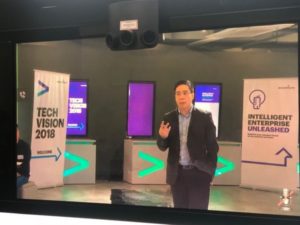People-centric tech trends continue

Accenture Philippines Managing Director and Digital Lead JP Palpallatoc talks about the five technology trends expected to disrupt companies in the next three years based on their Technology Vision 2018 report vis a teleconference at their office in Robinsons Cybergate.
CDN PHOTO/JOSE SANTINO S. BUNACHITA
Technology trends continue to be people-centric among global companies and businesses, according to leading global professional services company Accenture.
Continued advancements in artificial intelligence (AI) and other technologies are propelling business organizations to integrate themselves more on a day to day lives of people, according to Accenture’s Technology Vision 2018 report.
In a press briefing with reports in Manila and via teleconference with reporters in Cebu yesterday, Accenture Managing Director and Digital Lead in the Philippines JP Palpallatoc discussed about the contents of their annual technology report which is based on their survey of more than 6,300 business and IT executives in 25 countries all over the world.
“More than four in five respondents or 84 percent agree that through technology, companies are weaving themselves seamlessly into the fabric of how people live today,” he said.
The Technology Vision 2018, which is now on its 18th year, also identified five emerging technology trends that companies must address in order to succeed in today’s digital economy.
These trends are: Citizen AI, Extended Reality, Data Veracity, Frictionless Business, and Internet of Thinking.
According to Palpallatoc, Citizen AI highlights the need to raise AI to benefit business and society. With AI getting more mainstream, companies must also acknowledge its impact on people’s lives.
“However, with the reach and capability of AI growing, there’s a responsibility for companies to raise AI to be responsible and explainable to the people,” he said.
In the report, 81 percent of the executives surveyed said that in the next two years, they see themselves working side-by-side with AI as co-worker, collaborator, and trusted adviser. At the same time, 72 percent said it is important to gain the trust of companies and customers by being transparent with how AI does decision-making considering how complex the process could be.
As an example, he cited how Audi has expressly stated that they will take accountability and liability for accidents that would involve their self-driving A8 car.
As for extended reality, the report stated how virtual reality, augmented reality, and mixed reality are transforming how people live and work by removing distance to people, information and experiences.
For example, Palpallatoc said Walmart is using extended reality for first-time managers to experience a simulation of managing a Black Friday Sale in one of their stores for them to see and respond to possible concerns.
The report stated that 80 percent of executives said they are looking into integrating extended reality in their operations while 27 percent said they want to be pioneers in this area.
In Data Veracity, Palpallatoc highlighted the importance of trust in business. More companies are now powered by data, with 79 percent of executives saying they are using data more and more, he said there is a need to face vulnerabilities like inaccurate, manipulated and biased data that may lead to corrupted business insights and skewed decisions.
“Data is the lifeblood of companies. Data is the new oil. But data may also be the next asbestos. With wrong data, you can corrupt business insights and make skewed decisions as well,” Palpallatoc said.
Frictionless business means building to partner at scale. The report said that while business depend on technology-based partnerships for growth, their own legacy systems are not designed to support partnerships at scale.
This is why there is a need for companies to redesign themselves.
Lastly, Palpallatoc explained that “Internet of Thinking” means creating intelligent distributed systems.
He said that businesses are making big bets on intelligent environments through robotics, AI and immersive experiences. However, bringing these intelligent environments to life will require not only adding new skills and workforce capabilities, but also modernizing current enterprise technology infrastructures.
While most of the executives surveyed in the study conducted in November 2017 to January 2018 were from medium to large businesses, Palpallatoc assured that these trends are very much applicable to micro and small enterprises which comprise a significant percentage of businesses in the Philippines and in Cebu in particular.
“I don’t think we should be scared. We need to be responsible. We need to be ready,” he said.
Disclaimer: The comments uploaded on this site do not necessarily represent or reflect the views of management and owner of Cebudailynews. We reserve the right to exclude comments that we deem to be inconsistent with our editorial standards.
